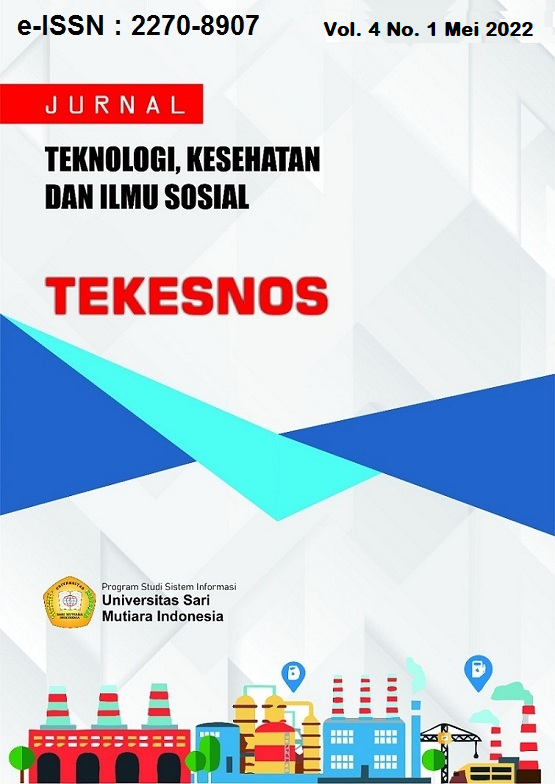Pembuatan Media Pertumbuhan Alternatif Pada Mikroorganisme Dengan Menggunakan Umbi Porang (Amorphophallus oncophyllus Prain) TERHADAP Staphylococcus aureus, Escherichia coli DAN Candida albicans
Keywords:
porang tubers, alternative growth, bacteriaAbstract
Porang tuber (Amorphophallus oncophyllus Prain) contains carbohydrates, fats, proteins, minerals, vitamins, and dietary fiber which are thought to be alternative growth media. This study aims to determine the growth of alternative media for microorganisms with Porang tubers. This research was conducted in the Pharmaceutical Chemistry laboratory, at Sari Mutiara University, Indonesia. Samples of Porang tubers were obtained from Porang plantations in the Amplas area, North Sumatra. This study uses an experimental method. Characterization of Porang tuber powder was found 9.54% water content, 9.09% water soluble extract content, and 1.43 total ash content.to contain%Secondary metabolites contained in Porang tuber starch were alkaloids and carbohydrates. The process of making starch begins with soaking with NaCl to remove the sap on the Porang tubers. Furthermore, the grating process is carried out until a precipitate of Porang tuber starch is found which will then be dried into Porang tuber starch. The manufacture of starch media respectively used a concentration of 5% (F1); 7.5% (F2) and 10% (F3). Then added agar, NaCl, and milk. Furthermore, microbiological tests were carried out using Staphylococcus aureus, Escherichia coli, and Candida albicans with the pour method. The comparison used is Nutrient agar and Potato dextrose agar. Furthermore, observations of the growth of these microorganisms were carried out. The results of the test Porang tuber starch showed yeast and bacteria growth media. The result of colony growth was found that the most colonies were found in formula 3 with Candida albicans as many as 297 colonies. The number of Staphylococcus aureus was found to be in formula 2 with 251 colonies, and for Escherichia coli, the most colonies were found in formula 3 with 143 colonies. Conclusion From the results of the study, it was found that Porang tubers can be used as growth media, Staphylococcus aureus, Escherichia coli, and Candida albicans.
Downloads
References
Adams MR, Moss MO. 2008. Food microbiology. Third Ed. Royal Society of Chemistry. Cambridge CB. WF: UK
Anisah., Rahayu, T. 2015. Media Alternatif Untuk Pertumbuhan Bakteri Menggunakan Sumber Karbohidrat yang Berbeda. Surakarta
An, N. T., Thien, D. T., Dong, N. T., Duna, P. L. and Du, N. V. 2011. Isolation and characteristics of polysaccharide from Amorphophallus corrugatus in Vietnam, Carbohydrate Polym. 84, 64–68.
Anonim. Candida albicans. [Cited 2012 Jan 21]. Available from:
http://id.wikipedia.org/wiki/Candida_albicans
Betoret, E, N, D. Vidal Dan P.Foto , 2011, Functional Foods Development : Trends and Technologies, Trend Foods sei & Technol, No (22) : 498-505
Chen, H.L., H.C. Cheng, W.T. Wu, Y.J. Liu and S.Y. Liu. 2008. Supplementation of konjac glucomannan into a low-fiber Chinese dietpromoted bowel movement and improved colonic ecology in constipation adults :a placebo-controlled diet-controlled trial. J. Am
Chua, M., Baldwin, T. C., Hocking, T. J. and Chan., K., 2010. Traditional uses and potential health benefits of Amorphophallus konjac K. Koch ex N.E. Br.: Review Article, J. of Ethnopharmac. 128(2), 268-278.
Dawam. 2010. Kandungan Pati Umbi Suweg (Amorphophallus campanulatus) pada Berbagai Kondisi Tanah di Daerah Kalioso, Matesih dan Baturetno. [Tesis]. Universitas Sebelas Maret. Surakarta
DepKes RI. 1980. Materia Medika Indonesia Jilid IV. Jakarta: Departemen Kesehatan Republik Indonesia
Dewanto, J. dan B. H. Purnomo. 2009. Pembuatan Konyaku dari Umbi Ilesiles
(Amorphophallus oncophyllus). [Tugas Akhir]. Universitas Sebelas Maret. Surakarta.
Ditjen POM. 1995.Farmakope Indonesia. Edisi IV. Jakarta: Depkes RI.
Ditjen POM.1979. Farmakope Indonesia. Edisi Ketiga. Jakarta: Departemen Kesehatan Republik Indonesia.
Escherich, T. 1885. Die Darmbakterien des Neugeborenen und Sauglings. Fortschr. Med. 3:515-522; 547-554
Gandjar, Indrawati, 2006. Mikrobiologi Dasar dan Terapan. Yayasan Obor
Indonesia, Jakarta
Harbone, B.J. 2006. Pengaruh Ekstrak Etanol Daun Jambu Air (Syzgiumaqueum)
Terhadap Bakteri Isolat Klinis . e-journal Penuntun Praktikum IPA.
Harti, A.S. 2014. Mikrobiologi Kesehatan. Yogyakarta: CV. Andi offset
Hiranya, Meganada, Sukini, Yodong. 2017. Mikrobiologi Keperawatan Gigi. Pusat pendidikan sumber daya manusia kesehatan. Jakarta
Jawetz, Melnick, Adelberg. 2013. Mikrobiologi Kedokteran Edisi 25. Jakarta : Salemba Medica.
Kaper, J.B., J.P. Nataro and H.L. Mobley. 2004. Pathogenic E. coli. Nature Reviews Microbiology 2 (2): 123-140
Koswara, Sutrisno. 2013. Teknik Pengolahan Umbi-Umbian : Pengolahan Umbi. Talas. Modul. IPB. Bogor.
Kurniawan, B. 2015. Binahong (Cassia alata L) As Inhibitor of Esheriacoli Growth. Faculty of Medicine. Lampung.
Nugraheni bekti, Intan Martha Cahyani, Kyky Herlyanti, 2017, Efek Pemberian
Glukomanan Umbi Porang Terhadap Kadar Kolesterol Total Darah Tikus
Yang Diberi Diet Tinggi Lemak, Sekolah Tinggi Ilmu Pharmasi,
Semarang
Noviana, H. 2004. Pola kepekaan antibiotika Escherichia coli yang diisolasi dari berbagai spesimen klinis. Jurnal Kedokteran Trisakti. 23(4)
Pratiwi, Sylvia T.2008. Mikrobiologi Farmasi. Jakarta: Erlangga.
Putri, Meganada Hiaranya, dkk. 2017. Mikrobiologi. Jakarta: Kementerian Kesehatan Republik Indonesia. Halaman: 272-288
Rosyidah, K., Nurmuhaimina., Komari, M.D., dan Astuti. Aktivitas Antibakteri Fraksi Saponin dan Kulit Batang Tumbuhan Katsuri (Mangiferacasturi). Bioscientiae. 2010:25-31
Saleh, Nasir. Dkk. 2015, Tanaman Porang Pengenalan, Budidaya, dan Pemanfaatannya, Pusat Penelitian dan Pengembangan Tanaman Pangan, Bogor
SNI, Tepung Tapioca, Jakarta
Soetojo, Shinta Dewi Rahmadhani dan Linda Astari, 2016,Jurnal Profil Pasien Baru Infeksi Kandida Pada Kulit Dan Kuku, Vol.28 / No.1/ April.2016, Surabaya
Sulistyoningsih danik, dkk, 2018, Identifikasi Glukomanan Umbi Porang (Amorphophallus oncophyllus Prain ex Hook.f.) dengan Metode TLC Densitometry. STIKES TELOGOREJO Semarang
Syaefulloh, S., 1990. Studi Karakteristik Glukomanan dari Sumber “Indigenous” Iles-iles (Amorphophallus oncophyllus) dengan Variasi Proses Pengeringan dan Basis Perendaman. Tesis Sekolah Pascasarjana IPB. Bogor
Thomas, W.R., 1997. Konjac Gum. Dalam Alan Imeson. 1999. Thickening and Gelling Agents for Food, Blackie Academic and Professional, London.
Uthayasooriyan M, Pathmanathan S, Ravimannan N, Sathyaruban S. Formulation of alternative culture media for bacterial and fungal growth. Der Pharm Lett. 2016;8(1):444-449
Wardani, Ratih Kusuma dan Prasetyo Handrianto, 2017, reduksi kalsium oksalat pada umbi porang dengan larutan asam, Penerbit Graniti, Gresik
Winarno F.G. 2004. Kimia Pangan dan Gizi. Jakarta : Gramedia Pustaka Utama.
Halaman 45-47.
Zhu, C., J. Harel, M. Jacques, C. Desautels, M. S. Donnenberg, M. Beaudry, and J. M. Fairbrother. 1994. Virulence properties and attaching-effacing activity of E. coli O45 associated with swine post-weaning diarrhea. Infection and Immunity 62: 4153-4159













